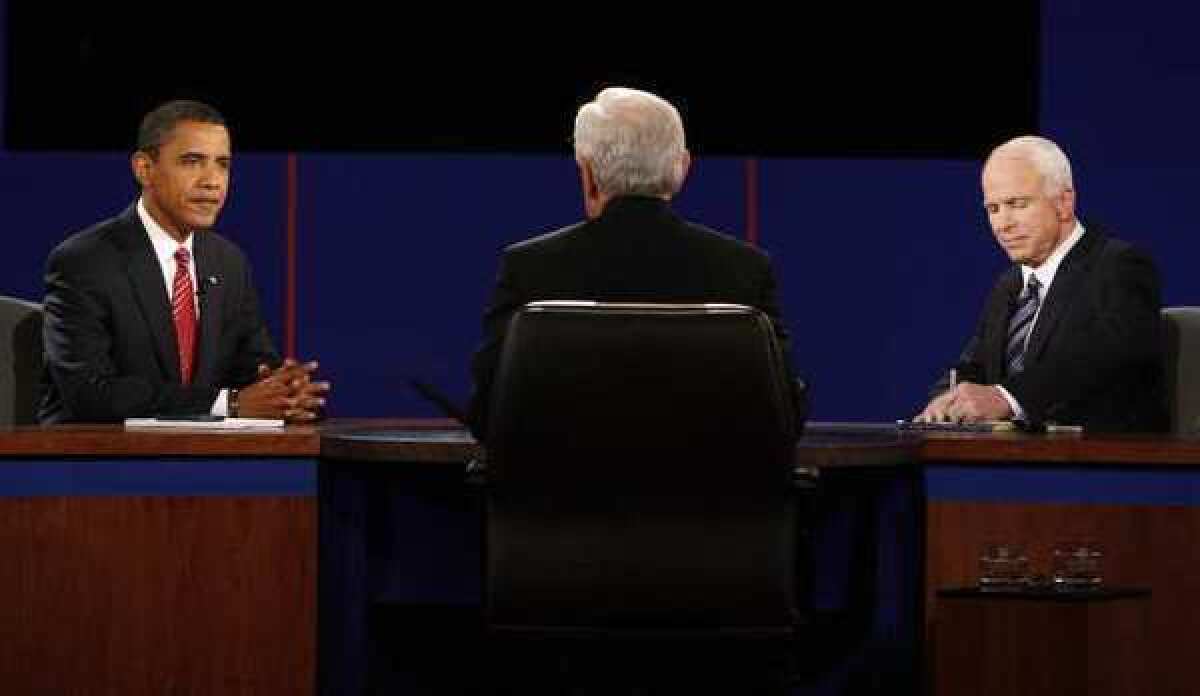Presidential debates: Why don’t they just answer the question?

- Share via
In next month’s three presidential debates, President Obama and Mitt Romney will be asked a wide range of questions crucial to the future of America. But if history is any guide, they are unlikely to answer many of them. Even worse, most of us won’t even notice.
Listen carefully to the questions and responses and you’ll understand. A candidate is asked a specific question: “How will you balance the budget?” The response is typically along the lines of: “Balancing the budget is critical to America’s future, which is why I am committed to it!” It feels like an answer; after all, the budget was mentioned in the question and the response. But parse the words and you’ll realize that you still have no idea how the candidate will balance the budget.
Public figures are adept at evading questions they would rather not answer. Henry Kissinger was famous for telling reporters, “Does anyone have questions for my answers?” And during one of the many Republican presidential primary debates, Romney gave us a candid glimpse of a philosophy some politicians apply when asked to answer direct questions. After the moderator suggested that the candidate had not answered a question he was asked, Romney retorted, “Look, you get to ask the questions you want; I get to give the answers I want.” Though we applaud his frankness, we lament that the practice he alludes to is so common in politics — on both sides of the aisle — and that it too often goes unnoticed.
COMMENTARY AND ANALYSIS: Obama vs. Romney
In our research, we have found that viewers are most likely not to detect dodging when politicians offer answers to similar, but objectively different, questions than the ones they are asked.
In one study, for example, participants were shown video of a politician being asked a question about his policy on either healthcare coverage in America, the illegal drug use problem in America, or America’s war on terrorism. He offered the same answer to all three questions: “I’m glad you asked me that. There are so many important problems facing America today. We need universal healthcare because…” and then proceeded to give a long answer about healthcare.
People who saw video of the politician who was asked about healthcare saw him as trustworthy, honest and likable; he answered the question he was asked, after all. But, disturbingly, those who were shown the politician being asked about illegal drug use also rated him as trustworthy, honest and likable, even though he dodged the question. Why? Because a question about drugs and an answer about healthcare feel vaguely related, viewers failed to notice he hadn’t answered the actual question he was asked.
INTERACTIVE: Outside spending shapes 2012 election
Still, not all dodges were equally effective. Viewers who watched the politician give his healthcare answer to a question about the war on terrorism — an egregious attempt to dodge — not only noticed the dodge but thought the politician was untrustworthy, dishonest and unlikable.
This blindness to artful dodges occurs in part because viewers often devote their limited attention to evaluating whether or not they like and trust the politician (the “would-I-want-to-have-a-beer-with-this-guy” test) and less to whether the politician answers every specific question. It is this psychological limitation that politicians exploit so masterfully when they dodge questions. Unless politicians outrageously dodge questions, viewers rarely notice.
One sensible solution might be to encourage moderators not to let dodging politicians off the hook. But moderators must balance competing demands during debates: ensuring that time is allocated evenly, raising each pre-determined issue and wanting to appear unbiased and professional. Indeed, when “Newsnight’s” Jeremy Paxman grilled British politician Michael Howard by asking him the same question 12 straight times — and still never got an answer — Howard suffered a hit, but so did Paxman, who some viewers found unfair and overly aggressively.
PHOTOS: Joe Biden wants to hug ... everyone!
If we can’t count on moderators to prevent politicians from dodging, how can we help voters detect dodges? Networks have been wrestling with this problem and have generated some innovative half-measures. For example, during one of the Republican presidential debates hosted by Fox News in January, viewers were asked to tweet #dodge and #answer to rate how directly each candidate answered each question. These Twitter ratings were even referred to once by one of the questioners when Newt Gingrich tried to dodge a question.
Our research suggests an even simpler, low-cost and consistent strategy: Broadcasters post the text of the specific question asked on the screen during the politicians’ answers. Our experiments show that this small visual tweak enables viewers to detect even the most artful dodges.
Politicians dodge questions when they believe their answers will negatively affect voter preferences. But these are often exactly the questions that voters most need answered to make informed voting choices. With a little help from those broadcasting the debates, by election day, voters just might get those answers.
Todd Rogers is an assistant professor of public policy at Harvard’s Kennedy School of Government. Michael I. Norton is an associate professor of marketing at the Harvard Business School and coauthor of the forthcoming book “Happy Money: The Science of Smarter Spending.” To participate in a study during the presidential debates, send an email to prezdebates@gmail.com.
More to Read
A cure for the common opinion
Get thought-provoking perspectives with our weekly newsletter.
You may occasionally receive promotional content from the Los Angeles Times.






